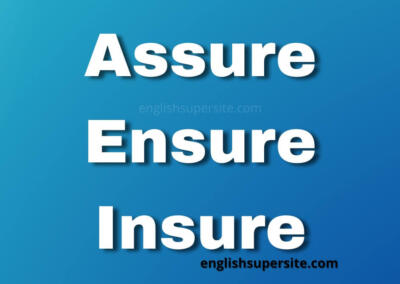
Past Perfect
Sometimes called Simple Past Perfect, the Past Perfect is one of the Verb Tenses associated with the Past Tense in English.
We use Past Perfect to express that an action or something has happened in the past and it has a connection with another action also in the past. The action in the past has a result in the past. The exact time is not important.
Usually these two actions are related, when this happens we put the first action in the Past Perfect and the other one in the Simple Past.
We also use it to express an action that happened at an unspecified time in the past.
Quick Example
- You had studied English a lot before you took the exam.
- You had not studied English enough before you took the exam.
- Had you studied English enough before you took the exam?
Form
| I – you – he – she – it – we – you – they |
|---|
| Regular verbs: had + past participle* Irregular verbs: had + past participle (List of Irregular Verbs – 3rd column)** |
*Pronouncing “ed” at the end of words
**List of Irregular Verbs
Common Signal Words
- Already
- Just
- Never
- Ever
- Before
- For
- Since
- Until
- Previously
Use
The Past Perfect is a verb tense used to express:
- An action that finished before another action in the Past
- Duration of something before another thing in the Past
1. An action that finished before another action in the Past
To expresses that and action or something occurred before another action in the past. It can also show that something happened before a specific time in the past.
- I had read the book before I watched the movie.
- I wasn’t able to login because I had lost my password.
- Peter had studied English a lot before he moved to Canada.
- Had Peter previously studied English before he moved to Canada?
- Mary had never been to a Broadway show before last night.
- She didn’t want to go with us because she had already seen the movie.
2. Duration of something before another thing in the Past
- He had had that truck for five years before it broke down.
- I had worked there for a very long time before I retired.
- I got stuck in traffic for two hours because there had been an accident.
Study Also:
Examples
Past Perfect using Work (Regular Verb)
| Affirmative | Negative | Interrogative |
|---|---|---|
| I had worked. | I hadn’t worked. | Had I worked? |
| You had worked. | You hadn’t worked. | Had you worked? |
| He had worked. | He hadn’t worked. | Had he worked? |
| She had worked. | She hadn’t worked. | Had she worked? |
| It had worked. | It hadn’t worked. | Had it worked? |
| You had worked. | You hadn’t worked. | Had you worked? |
| We had worked. | We hadn’t worked. | Had we worked? |
| They had worked. | They hadn’t worked. | Had they worked? |
Past Perfect using Go (Irregular Verb)
| Affirmative | Negative | Interrogative |
|---|---|---|
| I had gone. | I hadn’t gone. | Had I gone? |
| You had gone. | You hadn’t gone. | Had you gone? |
| He had gone. | He hadn’t gone. | Had he gone? |
| She had gone. | She hadn’t gone. | Had she gone? |
| It had gone. | It hadn’t gone. | Had it gone? |
| You had gone. | You hadn’t gone. | Had you gone? |
| We had gone. | We hadn’t gone. | Had we gone? |
| They had gone. | They hadn’t gone. | Had they gone? |
Past Perfect using Study (Regular Verb)
| Affirmative | Negative | Interrogative |
|---|---|---|
| I had studied. | I hadn’t studied. | Had I studied? |
| You had studied. | You hadn’t studied. | Had you studied? |
| He had studied. | He hadn’t studied. | Had he studied? |
| She had studied. | She hadn’t studied. | Had she studied? |
| It had studied. | It hadn’t studied. | Had it studied? |
| You had studied. | You hadn’t studied. | Had you studied? |
| We had studied. | We hadn’t studied. | Had we studied? |
| They had studied. | They hadn’t studied. | Had they studied? |
Study Also:
Abbreviations Cohesion and Coherence Collocations Comparative Conditionals Frequent Errors Future Continuous Future Perfect Future Perfect Continuous Future Simple Homonyms Interjections Journaling Learn English Linking Words Logical Flow Past Continuous Past Perfect Past Perfect Continuous Past Simple Plural Present Continuous Present Perfect Present Perfect Continuous Present Simple Pronunciation Question Tags Quiz Quotes Simple Future Simple Past Simple Present Spelling Superlative Transition Words
Share with your friends!






